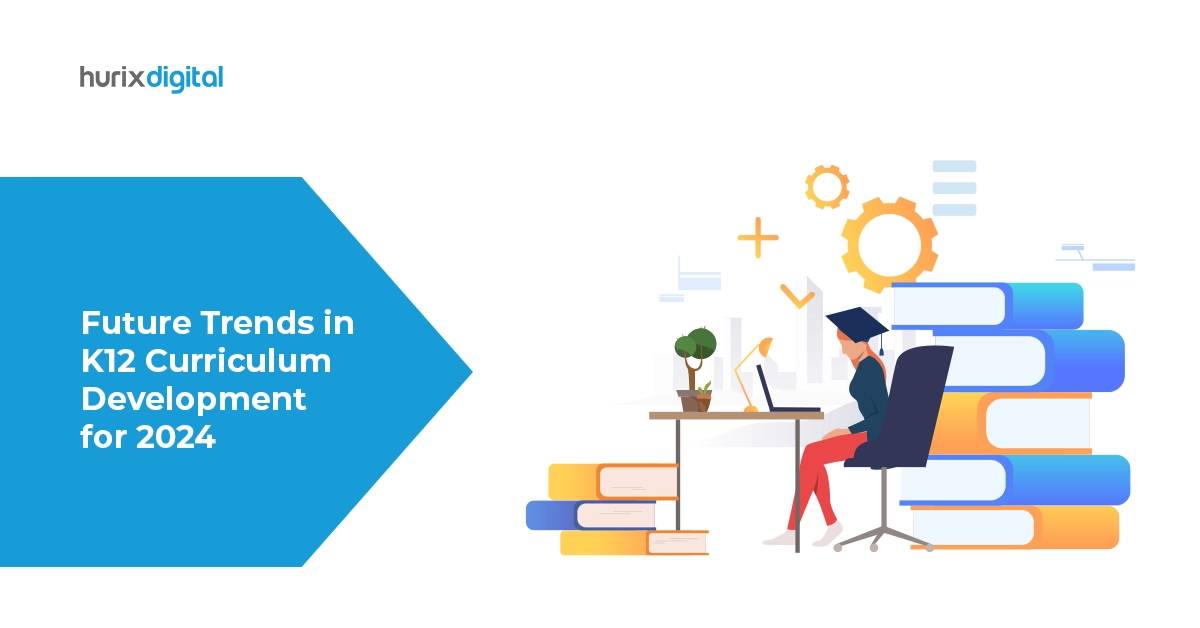
Top 8 K12 eLearning Companies in 2025 for Curriculum Development and Online Learning
Summarize with:
While online education has grown over the last decade, the COVID-19 pandemic and lockdowns have rapidly accelerated K12 eLearning adoption in schools.
With a predicted CAGR of 19.0% from 2022 to 2031, the global market for K12 online learning is expected to reach a value of USD 6099.9 million.
However, online education isn’t just a replication of the traditional classroom. Online learning gives students greater control over their learning, enabling them to trace their own learning paths and progress through the interactive modules at their own pace.
This blog explores the top eight online curriculum development services along with their key features, advantages, and disadvantages. Read on!
Table of Contents:
- Edmodo
- Schoology
- Hurix Digital
- Lightspeed Systems
- ALEKS Corporation
- BYJU’s
- Apex Learning, Inc.
- PowerMyLearning
What are Some of the Top K12 Curriculum Development Companies to Consider?
The role of the teacher also changes from a knowledge giver to that of a facilitator. Besides, the various course delivery platforms also have powerful assessment and reporting tools, allowing teachers to focus more on students.
Real-time tracking tools make it possible to track in real-time the progress of each student. Course administrators and developers can use this information to personalize learning for each student. Using various digital formats such as AI, VR, and audio/video, students can actually interact with the course and learn by doing.
All these factors necessitate a different approach to teaching and designing the course curriculum. Accordingly, several K12 curriculum development companies specialize in designing highly interactive content for schools.
1. Edmodo
This curriculum development company offers a safe and easy-to-use platform for teachers and students to connect and share content, and access homework, notices, and events. It also has collaboration and communication tools for resource sharing and networking.
This cloud-based platform can be accessed from any internet-enabled device. Schools can set up their own URLs and also access additional management, reporting, and analytical tools. The Edmodo platform is free for both teachers and students.
Advantages
- Offers a seamless user interface for both teachers and students to navigate easily
- Facilitates collaboration through discussions and group projects
- Allows teachers to share assignments and resources efficiently
Disadvantages
- Limited customization options
Also Read: Online Learning VS Traditional Learning
2. Schoology
This educational technology company provides a centralized cloud-based repository to connect people, content, and systems required to conduct educational classes.
Schools can leverage their curriculum development tools to personalize classes and improve students’ learning outcomes. It also has great collaboration tools, allowing smooth connections between teachers, students, and peers.
Advantages
- It enables teachers to customize the learning process due to interoperability with a range of educational resources and information archives
- Available on a mobile app that gives users access to instructional content from anywhere
Disadvantages
- Premium features can be expensive for some institutions
3. Hurix Digital
Hurix is one of the top curriculum companies with an impressive track record of creating and delivering best-in-class content for K12 education. The company has built a rich content repository of over 6,000 learning assets in the K12 domain.
Hurix’s flagship product, KITABOO, is used by leading K12 publishers worldwide to deliver their content. The platform currently has more than 10 million users in over 20 countries. Hurix also creates custom content for K12 education.
Advantages
- Hurix Digital provides students with tailored educational resources that can be modified to fit certain curricular requirements
- The platform offers multimedia-rich, interactive content that can increase student retention.
- The solutions it offers are adaptable to a range of educational environments, from small schools to large educational institutions, thanks to their easy scalability.
Disadvantages
- The implementation fees can be high for organizations with tight budgets.
4. Lightspeed Systems
The company has partnered with several sectors, including K12 and higher education, to provide highly interactive courses. Their content delivery platform, Relay, includes tools for collaboration and assessment and is highly scalable and extensible by design. Besides, it also provides features such as management, integrated filtering, monitoring, and protection for schools.
Advantages
- Offers insights into student engagement and usage patterns
- Provides effective content filtering to ensure a safe online environment for students
Disadvantages
- The platform may require training for effective use
5. ALEKS Corporation
This curriculum development company specializes in creating web-based content. According to the company, its educational software is founded on “groundbreaking research in mathematical cognitive science known as Knowledge Space Theory”.
The software can accurately assess students’ knowledge proficiency and accordingly deliver targeted instruction on the topics they most need to learn.
Advantages
- Offers detailed assessments to identify knowledge gaps and track progress
- Provides tailored instruction to promote different learning styles
Disadvantages
- Lack of detailed explanatory notes on the platform
6. BYJU’s
BYJU is a product of an Indian edtech company, which runs on a freemium model. Schools have free access to content for 15 days. The main delivery platform is a mobile app.
Besides providing educational content to all school students from classes 1 to 12, the company also trains students for competitive exams in India such as CAT, IAS, and IIT-JEE, as well as international exams such as GRE and GMAT.
Advantages
- Utilizes interactive videos and animations to make learning enjoyable
- Covers a wide range of subjects to ensure a well-rounded education
- Uses a two-teacher methodology to eliminate misconceptions and offer clarity of thought.
Disadvantages
- Subscription fees can be high for some
7. Apex Learning, Inc.
This K12 curriculum development company offers online courses in English, mathematics, science, social studies, fine arts, health and physical education, and Advanced Placement. Instruction and lectures are delivered ‘anytime, anywhere’ via live interactive video using the latest in pedagogical practices combined with powerful reporting.
Advantages
- Delivers analytics to track student progress and inform instructional strategies
- Offers online courses that allow students to learn at their own pace
Disadvantages
- Technical issues can slow down the learning process
8. PowerMyLearning
This K12 curriculum development company partners with various schools and higher education institutions to deliver custom learning programs through their award-winning digital learning platform, PowerMyLearning Connect.
Rather than using only technology to deliver classroom sessions in a virtual environment, the company is focused on delivering interactive courses to enable students to learn by doing and hone their problem-solving and analytical skills.
Advantages
- Provides a wide array of multimedia resources to support diverse learning styles
- Learners are free to choose their own hours and can take sessions from any location
Disadvantages
- Coding and IT expertise may be needed to customize a learning management system (LMS)
Also Read: How to Create and Deliver the Best K12 Learning Solutions
Takeaway
At a time when education is moving online, it is a good idea to match your K12 curriculum with the needs of your instructors and students, and also in sync with the online environment. As mentioned above, the online environment is vastly different from the traditional classroom, and while the courses may remain the same, the paths to meet the learning goals are very different. Unlike the traditional classroom, where the teacher is the knowledge-giver, in an online setting, students ‘seek and find’.
Accordingly, the K12 online curriculum has to be more interactive, engaging, entertaining, stimulating, and immersive so that students are willing to self-learn and build on their knowledge and skills. With online learning, aside from grasping the course contents, students learn by doing and, in the process, hone their problem-solving and analytical skills, which will hold them in good stead in real-world situations.
In this context, schools will benefit by partnering with companies providing K12 eLearning solutions to create courses in line with modern pedagogical practices and using cutting-edge technology to create immersive online courses.
At Hurix Digital, we offer a rich repository of math and science resources, featuring over 6,000 interactive and high-quality videos designed for K12 students.
If you’re unsure what features to prioritize when selecting a digital curriculum provider, our team is here to assist you. Connect with us for expert guidance and tailored solutions to enhance your online learning programs.
Summarize with:

Senior Vice President – Business Development
at Hurix Digital, with over 25 years of experience in EdTech and workforce learning. He excels in business development, customer relationship management, and scaling digital learning solutions, driving global growth through innovative content, simulations, and AI‑driven training offerings
 Upcoming Masterclass | Build an Army of Brand Evangelists using Training & Development | November 20th, 8:30 AM PDT | 11:30 AM EDT | 10:00 PM IST
Upcoming Masterclass | Build an Army of Brand Evangelists using Training & Development | November 20th, 8:30 AM PDT | 11:30 AM EDT | 10:00 PM IST




